Mark David Gerson's Blog, page 18
September 9, 2011
The Art of Healthy Feedback: Part I - How To Get It
Part I of a two-part series on asking for and giving healthy feedback.
While both pieces are focused on writing and other creative pursuits, they can be easily adapted to the many situations in our lives when we are giving or seeking help or advice.
 Stay in charge of your creative process by reading these guiding principles before sharing your work with anyone -- including your life partner or best friend.
Stay in charge of your creative process by reading these guiding principles before sharing your work with anyone -- including your life partner or best friend.
1. Be Protective.You have no more right to knowingly expose your work to influences that could harm it or set it back than you do your child. Seek out only those people and situations that will support you and your writing. Never assume that the people closest to you will be the most supportive. Always use your discernment.
2. Be Open.Your work, like your child, requires fresh air and outside influences. Don't be overprotective and suffocating. Be open to others' perceptions, comments and responses.
3. Be Aware.To everything there is a season. At different stages in your work and your process, you will be ready to hear different things. Respect where you are and seek only the type of feedback you are prepared to receive and integrate. Recognize when you are at your most raw and respect that.
4. Be Clear.Be clear about the type of feedback you require and desire.
5. Be Explicit.
Once you know what kind of feedback is appropriate at this time, ask for it -- clearly, directly and without equivocation. Your reader cannot know how best to support you unless you make your needs clear. If you are vague and unclear, you open yourself to comments you are not ready to hear, comments that could feel damaging, even if they're not intended to be so.
6. Be Strong.
Know what you want and don't be afraid to speak up when you're not getting it, or when you're getting something you didn't ask for. Remember, this is your work and your creative process. You have every right to seek out what will help and support you.
7. Be Discerning.The words on your page are an expression of you but they are not you. Negative comments, whether intentionally cruel or not, have no power to harm you, unless you abdicate your power and allow yourself to be hurt. In fact, take neither praise not criticism too seriously. Deep inside, you know your work's strengths and weaknesses. Tap into that inner knowingness and rely on it to discern which comments support you and serve your work at this stage in its development and yours.
• How can you be clearer in the feedback you seek?
• How can you be more discerning in who you ask for feedback?
• How can you be more respectful of your work's needs and your own when seeking feedback?
The Art of Healthy Feedback: A Two-Part Series I - How To Get It II - How To Give It
II - How To Give It
Adapted from The Voice of the Muse: Answering the Call to Write, (c) 2008 Mark David Gerson
Please "like" these Facebook pages:• The Voice of the Muse book • The MoonQuest movie • The MoonQuest book • Mark David Gerson
 Stay in charge of your creative process by reading these guiding principles before sharing your work with anyone -- including your life partner or best friend.
Stay in charge of your creative process by reading these guiding principles before sharing your work with anyone -- including your life partner or best friend.1. Be Protective.You have no more right to knowingly expose your work to influences that could harm it or set it back than you do your child. Seek out only those people and situations that will support you and your writing. Never assume that the people closest to you will be the most supportive. Always use your discernment.
2. Be Open.Your work, like your child, requires fresh air and outside influences. Don't be overprotective and suffocating. Be open to others' perceptions, comments and responses.
3. Be Aware.To everything there is a season. At different stages in your work and your process, you will be ready to hear different things. Respect where you are and seek only the type of feedback you are prepared to receive and integrate. Recognize when you are at your most raw and respect that.
4. Be Clear.Be clear about the type of feedback you require and desire.
5. Be Explicit.
Once you know what kind of feedback is appropriate at this time, ask for it -- clearly, directly and without equivocation. Your reader cannot know how best to support you unless you make your needs clear. If you are vague and unclear, you open yourself to comments you are not ready to hear, comments that could feel damaging, even if they're not intended to be so.
6. Be Strong.
Know what you want and don't be afraid to speak up when you're not getting it, or when you're getting something you didn't ask for. Remember, this is your work and your creative process. You have every right to seek out what will help and support you.
7. Be Discerning.The words on your page are an expression of you but they are not you. Negative comments, whether intentionally cruel or not, have no power to harm you, unless you abdicate your power and allow yourself to be hurt. In fact, take neither praise not criticism too seriously. Deep inside, you know your work's strengths and weaknesses. Tap into that inner knowingness and rely on it to discern which comments support you and serve your work at this stage in its development and yours.
• How can you be clearer in the feedback you seek?
• How can you be more discerning in who you ask for feedback?
• How can you be more respectful of your work's needs and your own when seeking feedback?
The Art of Healthy Feedback: A Two-Part Series I - How To Get It
 II - How To Give It
II - How To Give ItAdapted from The Voice of the Muse: Answering the Call to Write, (c) 2008 Mark David Gerson
Please "like" these Facebook pages:• The Voice of the Muse book • The MoonQuest movie • The MoonQuest book • Mark David Gerson
Published on September 09, 2011 10:51
September 6, 2011
Snap a Pic for Me and Promote Yourself / Part 6
Welcome to the latest installment of my online Readers' Gallery, featuring photos (and, now, videos, too!) of people from all over the U.S. and beyond reading my books -- in hard copy or ebook form. (You'll find previous posts and pics here, here, here, here and here.)
To get your photo (along with links to your books, website and/or other projects) included in a future installment, scroll to the bottom of the post.
Here's what writer Amy Robbins-Wilson (video above, and first pic below) says about The MoonQuest , which she read twice this past summer. She recorded the video at the summit of Maine's highest peak: Mount Katahdin. (If the video doesn't show for you, click here.)
Here are words and pictures from five other readers -- four human and one feline...
It's sadly rare that TV- and radio-show hosts have the time to read the books of the authors they interview. One such rarity is Charmaine Lee (above), who interviewed me last month for her Insights for the Soul show on Blogtalk Radio. This was my third time on her 90-minute show, an appearance dedicated almost entirely to The MoonQuest.
K. Andrew Turner (below) is an L.A. writer, writing coach and workshop facilitator who tells me he frequently revisits The Voice of the Muse for inspiration, both for his own writing and for his work with other writers.
Another writer-reader is Denver's Abdul Jaafari (below), who's working on an epic fantasy series of his own, to be launched in the next months with The Empress of Mortar.
Not all my readers are writers! Christine Robertson (below) is an Albuquerque Zumba fitness instructor who just likes to curl up with a good book!
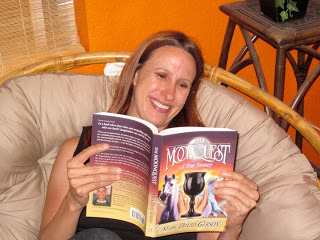
As for New York's Beatrice Lopatin (below), I suspect she may have misread the title, thinking it was The Voice of Mews. Still, I hear that her human, author Jared Lopatin, may have seized on Beatrice's error to read the book for himself.
To read more about any of these readers and their projects, and to see them in my Facebook gallery, click on their names, below:
Amy Robbins-WilsonCharmaine LeeK. Andrew TurnerAbdul JaafariChristine RobertsonBeatrice "Mews" Lopatin
Why not join the online fun and get your book, business, event, blog, websiteor other success promoted here, on Facebook and on Google+! Interested? Read on...
If you have a copy of either of my books, I'll ost a pic of you reading either The Voice of the Muse: Answering the Call to Write, The MoonQuest or both to my Readers' Gallery Photo Album on Facebook and Google+. I'll include you if you're listening to The Voice of the Muse Companion: Guided Meditations for Writers. Just make sure the CD cover is visible.
And to help you promote your book, event, business, success, blog and/or website, I'll include in the photo caption not only your name but your promotional info/link. I'll also post the next batch of reader pics here in a future blog item.
Simply email me your pic and caption information, or contact me via Facebook, Twitter or my website.
Feel free to send one pic or several and to include one book, both books, the CD or any combination. Just send separate photos for each item (unless you really are reading both books at the same time!).
And if you like my books, please "like" my Facebook pages:
 • The MoonQuest movie• The MoonQuest book
• The MoonQuest movie• The MoonQuest book
• Voice of the Muse book
• Mark David Gerson

To get your photo (along with links to your books, website and/or other projects) included in a future installment, scroll to the bottom of the post.
Here's what writer Amy Robbins-Wilson (video above, and first pic below) says about The MoonQuest , which she read twice this past summer. She recorded the video at the summit of Maine's highest peak: Mount Katahdin. (If the video doesn't show for you, click here.)
As a singer/songwriter/storyteller, this book spoke to my heart over and over. It tells of the dance between teller and tale and between singer and song. It takes you forward on an adventure that brings you back over and over again to a better self. If you love fantasy and story as I do, you will love this book.

Here are words and pictures from five other readers -- four human and one feline...

It's sadly rare that TV- and radio-show hosts have the time to read the books of the authors they interview. One such rarity is Charmaine Lee (above), who interviewed me last month for her Insights for the Soul show on Blogtalk Radio. This was my third time on her 90-minute show, an appearance dedicated almost entirely to The MoonQuest.
K. Andrew Turner (below) is an L.A. writer, writing coach and workshop facilitator who tells me he frequently revisits The Voice of the Muse for inspiration, both for his own writing and for his work with other writers.

Another writer-reader is Denver's Abdul Jaafari (below), who's working on an epic fantasy series of his own, to be launched in the next months with The Empress of Mortar.

Not all my readers are writers! Christine Robertson (below) is an Albuquerque Zumba fitness instructor who just likes to curl up with a good book!

As for New York's Beatrice Lopatin (below), I suspect she may have misread the title, thinking it was The Voice of Mews. Still, I hear that her human, author Jared Lopatin, may have seized on Beatrice's error to read the book for himself.

To read more about any of these readers and their projects, and to see them in my Facebook gallery, click on their names, below:
Amy Robbins-WilsonCharmaine LeeK. Andrew TurnerAbdul JaafariChristine RobertsonBeatrice "Mews" Lopatin
Why not join the online fun and get your book, business, event, blog, websiteor other success promoted here, on Facebook and on Google+! Interested? Read on...
If you have a copy of either of my books, I'll ost a pic of you reading either The Voice of the Muse: Answering the Call to Write, The MoonQuest or both to my Readers' Gallery Photo Album on Facebook and Google+. I'll include you if you're listening to The Voice of the Muse Companion: Guided Meditations for Writers. Just make sure the CD cover is visible.
And to help you promote your book, event, business, success, blog and/or website, I'll include in the photo caption not only your name but your promotional info/link. I'll also post the next batch of reader pics here in a future blog item.
Simply email me your pic and caption information, or contact me via Facebook, Twitter or my website.
Feel free to send one pic or several and to include one book, both books, the CD or any combination. Just send separate photos for each item (unless you really are reading both books at the same time!).
And if you like my books, please "like" my Facebook pages:
 • The MoonQuest movie• The MoonQuest book
• The MoonQuest movie• The MoonQuest book• Voice of the Muse book
• Mark David Gerson
Published on September 06, 2011 14:53
September 1, 2011
The Heartful Art of Re-Vision III: The Music of Revision
 What follows is Part III of my three-part series on my radical approach to polishing your work and your words. It's an excerpt from a Paris Review interview with Irish author J.P. Donleavy
What follows is Part III of my three-part series on my radical approach to polishing your work and your words. It's an excerpt from a Paris Review interview with Irish author J.P. DonleavyScroll to the bottom of the post for links to Parts I and II.
Paris Review: What do you look for when you revise?
J.P. Donleavy: What I look for is a kind of inevitability, the words and sentences falling into an inevitable place that relates to what's gone before and that will presage what follows. ... This is the inevitability -- the words on the page, which lie there naturally, which don't you jar you, and find their own naturalness when they're said or read.
I suppose I think of myself as a sort of scientist, working with words, relating what is going on in my consciousness to what I put on the paper. It's like music . . . an orchestration. As in bell-ringing, when you ring, peal the bells, one echoing sound from one word will echo and sound in another. ... I work a long time on the sound-sense of words.
 Occasionally I find myself trapped trying to get the rhythms down properly and sometimes something just won't work. There's one spot in
The Ginger Man
Occasionally I find myself trapped trying to get the rhythms down properly and sometimes something just won't work. There's one spot in
The Ginger Man
 that I've never been able to solve to this day. It isn't perfect. ... In some ways, I was relieved to know, coming back to that passage ten years later and deliberating over it again, that it couldn't be solved even now till this day with what one assumes is one's accumulated masterliness.
that I've never been able to solve to this day. It isn't perfect. ... In some ways, I was relieved to know, coming back to that passage ten years later and deliberating over it again, that it couldn't be solved even now till this day with what one assumes is one's accumulated masterliness.Click here for the complete Paris Review interview
The Heartful Art of Revision: A Three-Part SeriesI - Finding the "Vision" in Revision II - A Radical Approach to Editing III - J.P. Donleavy on the Music of Revision
COMING UP NEXT WEEKA two-part series on how to give and receive healthy feedback
Please "like" these Facebook pages:• The MoonQuest movie • The MoonQuest book • The Voice of the Muse book • Mark David Gerson
Published on September 01, 2011 18:31
August 31, 2011
The Heartful Art of Re-Vision II: A Radical Approach to Editing
 What follows is Part II of my three-part series on my radically heartful approach to polishing your work and your words.
What follows is Part II of my three-part series on my radically heartful approach to polishing your work and your words.This stark departure from traditional editing techniques is more effective than the old way because it respects both the inherent wisdom of your manuscript and your innate knowingness of what works and what doesn't. It's neither a left-brain method nor is it a right-brain one. It's whole-brain and whole-body approach that will revolutionize your view of editing and revision.
As I noted in The Heartful Art of Revision I, we're accustomed to seeing the editing process as a harsh, left-brain, punishing activity. What I propose instead is a new paradigm, one that respects your work in all its drafts and that also respects you as its creator.
One way to start on that path, apart from crafting a vision statement for your work is to let these seven principles guide you as you shape, hone and polish your words.
1. Be detached but loving.
Let your work sit quietly for a time before you launch into revision. That time could be a day, a week, a month or six months. And it could be longer or shorter from one piece of work to the next. The key is to give both you and your work the space and distance that allow you to approach it heartfully, objectively and discerningly. Respect your initial draft. Respect all your drafts. Don't be a slave to them. Allow your work to grow, change and mature.
2. Read aloud.
Whenever practical, read aloud. We are always more attuned to language, rhythm and flow when we read aloud. We often read more thoroughly when we read aloud. You will want to read your work silently as well, of course. But particularly at the beginning and each time you make major changes, your voice will tell you where you have strayed off course.
3. Be respectful, gentle and firm.
Treat each draft as you would your child — with love and without judgment. Revision is not about taking a broadax to your creation. It's about treating each draft as a necessary stage in its growth toward maturity. Just as you gently, sometimes firmly, guide your children toward the fulfillment of their unique destinies, guide your work with that same spirit of respect — for yourself as creator as well as for your creation, which has its own vision and imperative.
 4. Accept that language is not perfect.
4. Accept that language is not perfect. Do your best to bring your heart and vision to the page. Do your best to write the words and paint the images that most accurately reflect your dream and intention. As you revise, never hesitate to seek out more forceful and evocative ways to translate your vision onto the page. But remember that translation is an art and that language can rarely more than approximate emotion and experience. Think of the most wondrous scene you have ever witnessed and imagine trying to recreate that in words. You can come close. Yet whatever your mastery of the language, you will not recreate every nuance of your vision, emotion and experience. And that's okay.
5. Respect your intuition.
As you become more adept as a writer, more in tune with your work and its vision, and more in touch with your Muse, you will gain an intuitive knowingness of what works and what doesn't, without always being able to articulate why. That inner compass will direct you to the appropriate improvement or solution — again, often without explanation. Trust your intuition. It's the voice of your Muse, the voice of your vision. And it won't lead you astray.
6. Do your best.
Do your best to commit your vision to paper. Do your best to polish, enrich and enliven your work so that it aligns with that vision. Do your best on each piece of writing and, when it's time, let it go so that you can create a new work and do your best on that one as well.
7. Be the writer you are. Each piece of writing will teach you, and from each piece of writing you will mature in your art and your craft. Strive for excellence not perfection. Be the writer you are.
 • Adapted from The Voice of the Muse: Answering the Call to Write.(c) 2008 Mark David Gerson
• Adapted from The Voice of the Muse: Answering the Call to Write.(c) 2008 Mark David GersonThe Voice of the Muse book and CD are available at markdavidgerson.com and Amazon (book
 , CD
, CD ). E-versions of the book are available through Kindle, Nook, iBooks and Kobo. A downloadable version of the CD is available on CD Baby.
). E-versions of the book are available through Kindle, Nook, iBooks and Kobo. A downloadable version of the CD is available on CD Baby.
Art credits: Quill/parchment by Angela Farley, from The MoonQuest: A True Fantasy. Perfection image from "My World, My Home, My Life."
The Heartful Art of Revision: A Three-Part SeriesI - Finding the "Vision" in Revision II - A Radical Approach to Editing III - J.P. Donleavy on the Music of Revision (next)
COMING UP NEXT WEEKA two-part series on how to give and receive healthy feedback
 Please "like" these Facebook pages:•
The MoonQuest movie
•
The MoonQuest book
•
The Voice of the Muse book
• Mark David Gerson
Please "like" these Facebook pages:•
The MoonQuest movie
•
The MoonQuest book
•
The Voice of the Muse book
• Mark David Gerson
Published on August 31, 2011 10:11
August 29, 2011
The Heartful Art of Re-Vision I: Finding the "Vision" in Revision
We're accustomed to seeing the editing process as a harsh, left-brain activity too often filled with violent and abusive language: It's about forcing the work to our will, gagging, restraining or reigning in our characters, hacking away at our work or banging our manuscript into shape. Yet when we treat our drafts with such disrespect, we're also disrespecting ourselves as its creator.
 What follows is Part I of a two-part series on a more heartful approach to polishing your work and your words.
What follows is Part I of a two-part series on a more heartful approach to polishing your work and your words.
See the editing process as one of re-vision, of revisiting your original vision for your work and putting all your heart, art and skill into aligning what's on paper with that vision.
As you move through your piece -- whatever it is, whatever its length -- see yourself as a jeweler, delicately etching your rough stone into the gem that reflects the vision your heart has conceived and received, then lovingly polishing it until you achieve the look and texture you desire.
Your vision is the light force of your work, the life force of your work. It's the spirit that is its essence, the breath that keeps it alive. Your vision is your dream for your work, the expression of your intention. It's what guides it, drives it and propels it -- from conception to completion.
The more deeply you stay connected to that vision -- however broadly or specifically you have drawn it -- the more completely the finished piece will remain true to that life force, that dream, that intention. And the truer you will be to the work that has called upon you to commit it to paper and breathe life into it.
Creating a vision statement is one way to maintain and strengthen that connection. In the vision-statement examples that follow, the first is the one I created for The Voice of the Muse: Answering the Call to Write before it was finished. The others were written by coaching clients and workshop/coaching-group participants, the first and third were for works-in-progress and the second was for the overarching spirit of the writer's work.
What's your vision for your work-in-progress or for your work as a writer? Don't think about it. Feel it. And when you start feeling it, start writing it down. It doesn't have to make sense. Just let it be what it is.
 • For more information on how to articulate a vision statement for your work, see "Awakening Your Vision" in The Voice of the Muse: Answering the Call to Write. You'll also find a two-part meditation ("Vision Quest") in The Voice of the Muse Companion: Guided Meditations for Writers, designed to guide you through the process.
• For more information on how to articulate a vision statement for your work, see "Awakening Your Vision" in The Voice of the Muse: Answering the Call to Write. You'll also find a two-part meditation ("Vision Quest") in The Voice of the Muse Companion: Guided Meditations for Writers, designed to guide you through the process.
The Voice of the Muse book and CD are available at markdavidgerson.com and Amazon (book , CD
, CD ). E-versions of the book are available through Kindle, Nook, iBooks and Kobo. A downloadable version of the CD is available on CD Baby.
). E-versions of the book are available through Kindle, Nook, iBooks and Kobo. A downloadable version of the CD is available on CD Baby.
Please "like" these Facebook pages:• The MoonQuest movie • The MoonQuest book • The Voice of the Muse book • Mark David Gerson

 What follows is Part I of a two-part series on a more heartful approach to polishing your work and your words.
What follows is Part I of a two-part series on a more heartful approach to polishing your work and your words.See the editing process as one of re-vision, of revisiting your original vision for your work and putting all your heart, art and skill into aligning what's on paper with that vision.
As you move through your piece -- whatever it is, whatever its length -- see yourself as a jeweler, delicately etching your rough stone into the gem that reflects the vision your heart has conceived and received, then lovingly polishing it until you achieve the look and texture you desire.
Your vision is the light force of your work, the life force of your work. It's the spirit that is its essence, the breath that keeps it alive. Your vision is your dream for your work, the expression of your intention. It's what guides it, drives it and propels it -- from conception to completion.
The more deeply you stay connected to that vision -- however broadly or specifically you have drawn it -- the more completely the finished piece will remain true to that life force, that dream, that intention. And the truer you will be to the work that has called upon you to commit it to paper and breathe life into it.
Creating a vision statement is one way to maintain and strengthen that connection. In the vision-statement examples that follow, the first is the one I created for The Voice of the Muse: Answering the Call to Write before it was finished. The others were written by coaching clients and workshop/coaching-group participants, the first and third were for works-in-progress and the second was for the overarching spirit of the writer's work.
• The Voice of the Muse: Answering the Call to Write is about freedom: freedom to grow, freedom to create, freedom to write. Through a dynamic blend of motivational essays, inspiring meditations and practical exercises, it nourishes, nurtures and reassures its readers, inspiring them to open their hearts, expand their minds and experience, with ease, a full, creative life.~ Mark David Gerson
• Through the eyes of Lily Addams, A House of Gold will explore the arrival and lives of the Chinese immigrants here in Sacramento and the Foothills during the Gold Rush, as well as the possibilities for women during this transitional time in the Golden State. At a deeper level, at the very "heart" of the book, will be a story about the heart and becoming and staying whole-hearted through triumphs and trials, as well as through the daily joys and hurts that make up our lives. It is a book about heart, for heart, and by heart.~ Sue Cross
• Writing is choosing to dance with the The Goddess of Creativity, choosing to be in service to the Universe, choosing to surrender with Joy and Love to the Voice and Story that allows itself to be expressed through my Being and my experience.~ Vicki Daigneau
• Remembering Your Divinity, A Co-Creator's Guide to Manifesting by Heart is about creating -– by heart. Through a blending of science and mysticism, Remembering Your Divinity reminds you of who you are, why you are here, what it means to be a conscious co-creator, what creative energy is, how it flows, and how to use it, why the heart is the key to manifesting, and provides tools to stay in the flow of your creation so that you live as the God/Goddess that you are!~ Joan Cerio
What's your vision for your work-in-progress or for your work as a writer? Don't think about it. Feel it. And when you start feeling it, start writing it down. It doesn't have to make sense. Just let it be what it is.
 • For more information on how to articulate a vision statement for your work, see "Awakening Your Vision" in The Voice of the Muse: Answering the Call to Write. You'll also find a two-part meditation ("Vision Quest") in The Voice of the Muse Companion: Guided Meditations for Writers, designed to guide you through the process.
• For more information on how to articulate a vision statement for your work, see "Awakening Your Vision" in The Voice of the Muse: Answering the Call to Write. You'll also find a two-part meditation ("Vision Quest") in The Voice of the Muse Companion: Guided Meditations for Writers, designed to guide you through the process. The Voice of the Muse book and CD are available at markdavidgerson.com and Amazon (book
 , CD
, CD ). E-versions of the book are available through Kindle, Nook, iBooks and Kobo. A downloadable version of the CD is available on CD Baby.
). E-versions of the book are available through Kindle, Nook, iBooks and Kobo. A downloadable version of the CD is available on CD Baby.Please "like" these Facebook pages:• The MoonQuest movie • The MoonQuest book • The Voice of the Muse book • Mark David Gerson
Published on August 29, 2011 19:51
August 21, 2011
Acts of Surrender 23: Stuck in My Throat
 An excerpt from Acts of Surrender: A Journey Beyond Faith, my memoir-in-progress. Scroll to the bottom of this post for links to other recent excerpts.
An excerpt from Acts of Surrender: A Journey Beyond Faith, my memoir-in-progress. Scroll to the bottom of this post for links to other recent excerpts."Na'an came to me in a dream this night. It was early. I had not been in bed long and the night was newly dark. 'It is time,' she said, 'time to fix The MoonQuest on parchment.'" ~ The MoonQuest: A True Fantasy
I've had a raw throat and stuffy head for nearly a week now. Through much of that time, I've done little other than sleep, guzzle gallons of water and honey-infused tea, and clear my throat.
"Oh," you might murmur with sympathy, "a summer cold."
I don't look at it that way. Whenever something physical goes out of whack for me (mercifully, not often), I spend at least as much time tuning in to what in my emotional life precipitated it as I do to self-care. My philosophy is that if I look after the underlying cause, the symptoms will largely take care of themselves.
When the throat-clearing kicked in, I knew that it was about my voice. Not my speaking voice (even as I grew hoarse and teetered on the edge of laryngitis). My writer's voice.
And when my throat got worse on Thursday, after Anvil Springs producer Kathleen Messmer and I spent the afternoon compiling ideas for directors and a principal cast for The MoonQuest movie, I knew it had something to do with the film project.
I was even clearer that evening, after we added a particularly illustrious director to the top of our list.
 This isn't the first time we've assembled an A-list slate of actors and directors for the The MoonQuest movie. But something about this director pushed all my worthiness buttons. I spent the evening feeling intimidated by the prospect of not only working with someone of that caliber, but of having someone that, well, literate, read my screenplay.
This isn't the first time we've assembled an A-list slate of actors and directors for the The MoonQuest movie. But something about this director pushed all my worthiness buttons. I spent the evening feeling intimidated by the prospect of not only working with someone of that caliber, but of having someone that, well, literate, read my screenplay.This director has acted in and/or directed nearly three dozen films, and has won close to half of the four dozen awards he's been nominated for. As well, two of his Oscar nominations were for a film that, indirectly, helped propel The MoonQuest book to completion. He's also had an award-studded history on the stage.
I spent the next day letting myself feel my fear and discomfort, grudgingly grateful for the opportunity to work through yet another personal growth issue, one that had little to do with a potential director and everything to do with me.
During the many years when The MoonQuest book was nothing but a stack of manuscript pages languishing in a file box, I kept telling myself that regardless of whether it was ever published, the life lessons I'd learned while writing it had been valuable beyond measure.
 It's true. Writing
The MoonQuest
the way I did -- moment-by-moment, word-by-word, with no idea where my Muse was taking me with the story -- prepared me for a life of ever-deepening surrender to my story, to the life story that has revealed itself to me in each moment through that infinite mind I wrote about here a while back.
It's true. Writing
The MoonQuest
the way I did -- moment-by-moment, word-by-word, with no idea where my Muse was taking me with the story -- prepared me for a life of ever-deepening surrender to my story, to the life story that has revealed itself to me in each moment through that infinite mind I wrote about here a while back.It's also true that I had to tell myself that, or I would have been hard-pressed to feel good about all the time I'd invested in a project that, for too long, seemed to be going nowhere.
Similarly, I kept telling myself through the day Friday that, in the long run, my current journey was not about whether a particular director would sign on, or whether there would even ultimately be a MoonQuest movie. It was about what I'm learning and about all the ways I'm growing along the way.
This morning, still hoarse and laryngitic, my head still feeling as though it was jammed with mucus-soaked cotton balls, I wondered why I wasn't feeling any better. After all, I had identified the root cause of my physical discomfort and had committed myself to doing whatever it would take to move through and past my feelings of fear and unworthiness.
And then, while I was out walking, I had flash of Na'an's words to a reluctant Toshar in the prologue to The MoonQuest book: "It is your story to tell," she insists. "It is for you to fix it in ink, to set the truth down for all to read."
"So many seasons of storytelling and still I hesitate," Toshar replies. "Of all the stories to stick in my throat, how ironic that it should be The MoonQuest, a tale of the freeing of story itself."
When, in 1994, I began writing The MoonQuest, this "tale of the freeing of story," I was freeing my story. I was dissolving not only Toshar's reluctance, but mine. I was breaking through not only generations of repressed creativity in Toshar's heartland, but decades of creative block within myself.
As I've written here before, I don't like the expression "coming full circle" because it suggests that we're returning to a place we've already been, having learned nothing and grown not at all. My preferred image is that of a spiral, where we return to a place along the same axis, but at a higher level of consciousness and understanding.
 As I wrote in
The Voice of the Muse: Answering the Call to Write
, "Each cycle's completion returns you not to where you began but to a higher level of awareness, mastery, openness and trust." I wrote that about the creative process, but isn't life the ultimate creative process?
As I wrote in
The Voice of the Muse: Answering the Call to Write
, "Each cycle's completion returns you not to where you began but to a higher level of awareness, mastery, openness and trust." I wrote that about the creative process, but isn't life the ultimate creative process?Now, I realized on my morning walk, The MoonQuest is once again "stuck in my throat." Not in the same place it was stuck 17 years ago, when the Toshar in me tried to avoid telling his story. It can't be. I've moved through many turns of the spiral since then, turns that got the story written, the book out and the screenplay completed and on the cusp of production.
What's sticking in my throat now -- what's causing my hoarseness and loss of voice -- is the prospect of taking The MoonQuest to a new level: letting it be read by Oscar-nominated professionals and exposing it (and me) to audiences far greater than the book could ever reach.
Like Toshar, I'm scared. Like the Mark David who was creatively shut down for so many years, I'm afraid of being judged...and found wanting. Like so many creative artists through the millennia, I'm terrified that I'll finally be revealed as a fraud.
And so my story sticks in my throat, as parts of me try to protect other parts from the perceived danger of moving forward.
Years ago, in the early days of my conscious spiritual and creative awakening, before I know there was a MoonQuest inside me, I had a dream.
In the dream, I'm walking out of a multistory parking structure when the uniformed attendant steps out of his booth and stops me. He won't let me leave. I shout. He shouts. I shove. He shoves.
 I woke from the dream drenched in perspiration, more angry than frightened. Later that day, as I had done in the past, I took the dream-confrontation into meditation.
I woke from the dream drenched in perspiration, more angry than frightened. Later that day, as I had done in the past, I took the dream-confrontation into meditation."Why won't you let me leave," I ask the guard, politely this time.
"I'm afraid that if I do, I'll be out of a job," he answers simply.
"I still need you," I offer reassuringly. "But I need you to act more as a filter than as a gate. I need you to protect me more discerningly."
"I don't know how," he counters.
"Are you open to learning how?"
He pauses for a moment, his face screwed up in concentration.
"Yes." He nods. "I am." He stands aside to let me pass from the dank dark of this structure -- this place of parking, of storage, of non-motion -- but not before we've shaken hands and hugged.
Today's fear, today's self-judgment, today's stuckness in my throat -- they all come from the present-day equivalent of that dreamworld parking attendant, trying to protect the only way he knows how.
Today, once again, I ask him to be more discerning, to widen the weave on the screen of his filter, to not only let me move forward but to come along for the ride in his once-again redefined job. And as I do so, I feel the rawness in my throat abate somewhat and sense some of the stuckness of the past week begin to unstick.
The MoonQuest is once again on the move...and so am I.
"I see it all now, in the leap of light against dark. The shadows will tell me the story and I will write what I see. I will write until my fingers and beard are black with ink. I will write until the story is told. Only then will I be free to continue my journey. ..."
~ The MoonQuest: A True Fantasy
**********
• Read the full prologue and first chapter of The MoonQuest
• Read another excerpt from The MoonQuest book
• Read more about The MoonQuest book and film project
• Order your copy of The MoonQuest book in hard copy or ebook format
• "Like" The MoonQuest book and movie on Facebook
• Tune in to Insight for the Soul Radio, August 22 at 7pm PT, when Mark David talks to host Charmaine Lee about his MoonQuest journeys. Use the same link to download/listen to an archived version of the broadcast.
Photo: Nightmare parking structure by Mark David Gerson.
**********
Adapted from Acts of Surrender: A Journey Beyond Faith, my memoir-in-progress. (c) 2011 Mark David Gerson. Please share as you feel called to. But please, also, include a link back to this post.
Recent Acts of Surrender excerpts:
• November 15
• March 7
• May 22
• June 12
• July 9• July 19

Published on August 21, 2011 12:11
August 14, 2011
In The Moment...In Your Writing and Your Life
 Too often we sit in judgment of ourselves and our work.
Too often we sit in judgment of ourselves and our work."This is not good enough," we think. "This will never be good enough." Or, "This story has been told better before by someone else." Or, "This book has been written before."
Know this now and for all time: It is good enough. In this moment, this word is good enough...and so is this one.
This moment is always as good as it gets -- in this moment. So make the best of it.
In this moment, give yourself permission to write the worst junk in the world, the same permission I give myself in this moment when I fear what I write for you isn't good enough. It is, in this moment. I must believe this, as must you, or we can never move into the next moment and then the next, when those moments, too, form the present moment.
It is good enough. If you do your best to write freely and easily from your heart, it is always better than good enough. It is perfect.
Whatever you write is perfect. Whatever you experience is perfect. Whatever you feel is perfect. In this moment. Which is the only moment that matters, for it is the only moment that exists.
• What can you do in this moment to bring you back to the present moment? • What can you stop worrying about, wondering about or trying to figure out? • What can you stop judging? • Can you apply those questions as much to your life as you do to your writing...as much to your writing as you do to your life?
Close your eyes for a moment. Focus on your breath. Be present. With your words. With your writing. In your life.
 • adapted from The Voice of the Muse: Answering the Call to Write (c) 2008 Mark David Gerson
• adapted from The Voice of the Muse: Answering the Call to Write (c) 2008 Mark David Gerson• You'll find additional tips and inspiration on my website, where you can read my "Rules for Writing," sign up for my mailing list and read/hear more free excerpts from The Voice of the Muse: Answering the Call to Write.
Photo: "In Search of Lost Time" by Alexander Boden
Please "like" these Facebook pages:• The MoonQuest movie • The MoonQuest book • The Voice of the Muse book • Mark David Gerson
Published on August 14, 2011 07:14
August 5, 2011
You Can Write (Yes, You Can!)
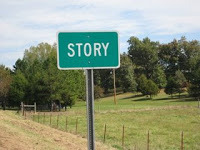 Close your eyes and remember.Remember the stories you invented...
Close your eyes and remember.Remember the stories you invented...Remember wonder and imagination...
Remember make-believe...
You can write.
If you can read these words, you can write.
You're saying "I'm not creative" or "I can't make up stories" or "I don't know how."
Well, you are, you can and you do. And you can do it without struggle.
Whoever you are, whatever your background, whatever your education, you can write -- in ways that bring meaning to your life, in ways that touch others.
 The ability exists in all of us. We were born with it, with a unique voice, a unique way of seeing and describing the world, a unique palette of textures, images and hues with which to express what we feel, what we see, who we are.
The ability exists in all of us. We were born with it, with a unique voice, a unique way of seeing and describing the world, a unique palette of textures, images and hues with which to express what we feel, what we see, who we are.As children we concocted imaginary places and playmates, soared with seagulls, raced with tigers. Close your eyes and remember. Remember the stories you invented. Remember wonder and imagination. Remember make-believe.
Watch your children, or your neighbor's children. Listen to the timeless stories they weave. We all crafted similar riches as children but, somehow, life got in the way. We grew more self-conscious. We were told not to make up stories. We feared being different. We were taught to write a certain way. We grew older, busier, more cautious. Slowly and without our being aware of it, the door to our creativity edged shut.
 Now we wonder whether the key is lost for all time. It's not. That key remains within your grasp, always. It's your birthright. It's your story, your voice. And it has value.
Now we wonder whether the key is lost for all time. It's not. That key remains within your grasp, always. It's your birthright. It's your story, your voice. And it has value.There are many ways to unlock that door...
• Start by letting the child you were back into your life -- not to displace the adult you've become, but to enrich it.• Start asking how and why again.• Slow down.• Run your hand over a tree trunk.• Inhale the perfume of an autumn evening.• Get up early and watch the sun rise.• Study people. See how they walk. Hear how they talk. Make up stories about them.• Pretend you're on vacation and start a journal, recording your impressions of people and places as though seeing them for the first time.
Try writing for 15 minutes without stopping, without thinking, without editing. You'll be amazed at how much you can write in such a short time. You'll be amazed at how good it is.
Don't censor yourself. Give yourself permission to write nonsense. Give yourself permission to begin without knowing where you're going. Writing is a voyage of discovery. Be open to the journey.
Look for books and groups that support your creativity, that let you tap into the writer you are. Find a quiet place and quiet time where you can write regularly. Find a quiet place within yourself.
Listen.
The stories are there.
Photo #1 + #2 by Mark David Gerson: Story, AK + Pyramid Lake, NV.
Please "like" these Facebook pages:• The MoonQuest movie • The MoonQuest book • The Voice of the Muse book • Mark David Gerson
Published on August 05, 2011 12:12
July 24, 2011
The Voice of the Muse: "One of the Best Books on Writing I've Ever Read!"
 I don't usually post complete reviews of my work on my blog, but this review, for The Voice of the Muse: Answering the Call to Write, so eloquently expresses my intent and philosophy in writing the book, that I can't help but share it here with you. The review was posted yesterday on Amazon
I don't usually post complete reviews of my work on my blog, but this review, for The Voice of the Muse: Answering the Call to Write, so eloquently expresses my intent and philosophy in writing the book, that I can't help but share it here with you. The review was posted yesterday on Amazon as the book's 26th five-star review by author/coach Julie Isaac, founder of Twitter's #writechat.
as the book's 26th five-star review by author/coach Julie Isaac, founder of Twitter's #writechat.A Guest Post by Julie Isaac
 I've read dozens of books on writing, but none have moved me as deeply as The Voice of the Muse.
I've read dozens of books on writing, but none have moved me as deeply as The Voice of the Muse.Mark David's words are not only eloquent, they have a meditative quality about them that takes me directly to the core of my own creative being. He picked the perfect subtitle, "answering the call to write," because his book is the embodiment of that call. Every page invites me to open, and then compels me to write.
His approach is decidedly spiritual, yet it's the spirituality of being totally present, open, courageous, alive, and consciously connected to your creative source. He often talks of surrendering -- to your writing, to your Muse, to your deepest and most sacred Self. He says that "when you sit down at the black page or screen, you have three simple tasks: Trust. Let go. Leap." There are several guided meditations in this book
 , but simply opening to any page, and reading, can give you something to meditate about, or inspire you to write.
, but simply opening to any page, and reading, can give you something to meditate about, or inspire you to write.  To help me find a way to sum up what this wonderful book means to me, I opened up The Voice of the Muse to see where it would lead me. The page I landed upon was the title page for chapter 5. There, in large bold letters, it said, "listen to your heart." What a perfect message to receive, for the call to write both emanates from, and ends within, the heart. It is with our heart that we hear the voice of the muse calling us to write. And it is from the still and silent center within our heart that our "yes" joyously arises to answer the call.
To help me find a way to sum up what this wonderful book means to me, I opened up The Voice of the Muse to see where it would lead me. The page I landed upon was the title page for chapter 5. There, in large bold letters, it said, "listen to your heart." What a perfect message to receive, for the call to write both emanates from, and ends within, the heart. It is with our heart that we hear the voice of the muse calling us to write. And it is from the still and silent center within our heart that our "yes" joyously arises to answer the call. Mark David Gerson's, The Voice of the Muse: Answering the Call to Write sits atop my list of favorite writing books, and holds a very special place in my heart. I highly recommend it.
• For more information on The Voice of the Muse: Answering the Call to Write and The Voice of the Muse Companion: Guided Meditations for Writers (CD), including text and audio excerpts, visit Mark David's website.
• Join Julie Isaac on Twitter every Sunday from noon to 2pm PT. Look for the hashtag #writechat.
 Please "like" these Facebook pages:
Please "like" these Facebook pages:• The MoonQuest movie
• The MoonQuest book
• The Voice of the Muse book
• Mark David Gerson
Published on July 24, 2011 09:54
July 19, 2011
Acts of Surrender 22: Catching Up With Myself

"Know first, child, that you needn't understand everything, that mystery is among life's greatest gifts."
~ Eulisha, in The MoonQuest: A True Fantasy
1.
For over a year now, I've been a regular featured guest on Rev. Carla McClellan's Spiritual Coaching radio show on Unity.fm. It began as a one-off slot after another Unity host, Jamie Sanders, recommended me to Carla. But she and I got on so well and our conversation was so lively, natural and inspired, that I've returned pretty much every month since.
Yet as much fun as each encounter with Carla has been, today's blew the fun-meter off the chart. And while I know it inspired listeners, it delivered a particularly powerful punch for me, too. The topic this afternoon was fear, and we spent a lot of time talking about The MoonQuest, where fear is a key theme -- both in its story and in my experience of writing it.
Toward the end of the hour, I found myself sharing several stories around my time in Nova Scotia, where, in 1994-95, I wrote most of the novel's first two drafts.
 I've written before about The MoonQuest's genesis and about how it leapt to life during a Toronto writing workshop I was teaching. The morning after that March 1994 workshop, I continued writing on the story (a story I knew nothing about, except as it emerged onto the page) until June of that year, when I made an exploratory visit to Nova Scotia.
I've written before about The MoonQuest's genesis and about how it leapt to life during a Toronto writing workshop I was teaching. The morning after that March 1994 workshop, I continued writing on the story (a story I knew nothing about, except as it emerged onto the page) until June of that year, when I made an exploratory visit to Nova Scotia.It would be five months before I would return to work on that first MoonQuest draft.
The Toronto workshop took place in a living room still strewn with unpacked boxes. I had just moved from the one-bedroom downtown apartment that had been my home for eleven years to a spacious flat near High Park, one of Toronto's biggest open spaces.
When I moved to High Park, it was with the dream that this would be a transitional move that would ultimately take me out of the city and into the rolling Caledon highlands northwest of Toronto. My goal: country living in five years.
I was sharing this goal with my friend Tammy one April morning. Tammy had followed me from Montreal to Toronto and lived nearby. We didn't see each other often, but we spoke on the phone regularly -- not about anything profound. Until this day.
"You're going to think this is crazy," she began in her characteristically self-diminishing way, "but I can actually see you living in the country. East of here, somewhere. Near the water. It could be on Lake Ontario. But it seems more like Maine. Or Nova Scotia."
Tammy would never have described herself as psychic or intuitive, and I'm not sure she believed what was coming out of her mouth. But for the next twenty minutes, she painted a detailed picture of how she saw my life unfolding. It was stunning in its detail. What was more stunning still was how accurate it all seemed. Not in its precision but in its feeling.
"Okay," I thought. "Five years from now. Why not?"
Thirty minutes later I was on my bicycle, heading west along Annette Street toward the winding Humber River bike trail.
"Yarmouth," a voice whistled to me on the breeze. "Yarmouth," it repeated through my afternoon ride along the river trail.
 I knew Yarmouth was in Nova Scotia. But that's all I knew. When I got home in those pre-Google days, I pulled out my atlas and found it: the largest town in southwest Nova Scotia, right across the Bay of Fundy from Maine.
I knew Yarmouth was in Nova Scotia. But that's all I knew. When I got home in those pre-Google days, I pulled out my atlas and found it: the largest town in southwest Nova Scotia, right across the Bay of Fundy from Maine."Yarmouth is as good a country-place-by-the water as any," I thought, shutting my Rand-McNally. "Anyhow, it's five years away."
Or so I thought...
As the weeks passed and I surrendered more and more fully to the idea of moving to Nova Scotia, I could feel that timeline collapsing in on itself. Five years became three years and then two. There was nothing logical about this. Hell, there was nothing logical about anything in my life anymore. It was more an intuitive feeling-sense, one that would often come over when I went for my daily walks in High Park.
On the day an eighteen-month target shrank to twelve, I collapsed onto the nearest rock, pulled my journal from my backpack and scribbled furiously. What would it be like to leave Toronto? What would it be like to move somewhere I'd never been?
My life to that point had been so controlled. The riskiest thing I had ever done was move to Toronto, and that hadn't been much of a risk at all: I knew the city well and had friends there. And my gig as Canadian stringer for The Chronicle of Higher Education newspaper guaranteed me a basic income.
But Nova Scotia? In a year?
The first thing to do, I determined, was to get out there for a visit. (I hadn't reached the trust point I would reach a few years later: one that would let me move to Hawaii sight unseen.)
2.
If I expected a trip littered with Old Testament-style miracles that confirmed my inner sensings, I wasn't disappointed. After all, miracles are ever-present when we open our eyes to see them.
 The first occurred just after I got to Halifax. Down the street from my B&B, a cramped second-run theater was showing Kenneth Branagh's Henry V
The first occurred just after I got to Halifax. Down the street from my B&B, a cramped second-run theater was showing Kenneth Branagh's Henry V , which I'd somehow managed to miss when it had first hit the screen five years earlier.
, which I'd somehow managed to miss when it had first hit the screen five years earlier.To this day, the battle scene where, against overwhelming odds, Henry and his ragtag army defeat the French on St. Crispin's Day moves me deeply — often to tears. It's a reminder that, with faith, nothing is impossible.
When I left the theater that cool Halifax night, I was even more certain about my Nova Scotia move. But just in case I might waver, I returned to see the movie again the following night.
I still didn't know what I would explore through my scheduled two week of Maritime travel. But after two viewings of Henry V, I felt sure that, like Henry's army, I could walk away from the battlefield of my own fears singing Non nobis domine, and all would be well.
My two weeks in Nova Scotia were filled with magic — the magic of freedom that came with my first-ever road trip, the numinous magic of land- and seascape, the magic of Dorothy Gilman's Nova Scotia memoir, A New Kind of Country, which led me to the collection of villages (Pubnico, West Pubnico, East Pubnico, Middle East Pubnico and Lower East Pubnico) that I knew would be my Nova Scotia home, and the magic of synchronicity, which turned up most eloquently in the parking lot of a West Pubnico pharmacy one Sunday afternoon.
Jung described synchronicity, a term he coined, as "meaningful coincidence," and that late July experience certainly fit that description.
Earlier that afternoon, I had returned to Chez Marie, my West Pubnico B&B, with feet so sunburned from a leisurely beach walk at Cape Sable that I could barely stand wearing shoes.
 In all the Pubnicos (five), there was only one pharmacy. And on Sundays the Pharmasave was open for only a single hour, from six to seven. At 5:45 p.m., I pulled into the parking lot in my burgundy Chevy Corsica, tuned, as always, to the radio service of the Canadian Broadcasting Corporation. On the air was Cross Country Checkup, the network's call-in show. The topic: "giving it all up to follow your dream." The featured guest in that moment? The editor of The Yarmouth County Vanguard, who had recently quit her corporate job in Montreal to return to her Acadian roots in southwest Nova Scotia.
In all the Pubnicos (five), there was only one pharmacy. And on Sundays the Pharmasave was open for only a single hour, from six to seven. At 5:45 p.m., I pulled into the parking lot in my burgundy Chevy Corsica, tuned, as always, to the radio service of the Canadian Broadcasting Corporation. On the air was Cross Country Checkup, the network's call-in show. The topic: "giving it all up to follow your dream." The featured guest in that moment? The editor of The Yarmouth County Vanguard, who had recently quit her corporate job in Montreal to return to her Acadian roots in southwest Nova Scotia.I was so riveted by Anne's story that I nearly missed the West Pubnico pharmacy's narrow opening-window. The next day, I drove to the Vanguard's Yarmouth office, introduced myself and shared my story. Anne's office would be my first shaky stop, ten weeks later, when, on my fortieth birthday, I passed through Yarmouth on my way to my new Pubnico home.
When I got back to Toronto a few days later, I was still aiming for a spring move. After all, I was scheduled to start teaching a ten-week writing class at the University of Toronto the following month.
My Muse had other plans: While the two other sections of the ever-popular class were filling up nicely, no one had signed up for mine. I was stunned. "If the class isn't a go," I told myself, "I'll look at leaving Toronto in the fall." A day later, I recanted. I realized that I'd spent all my life letting external circumstances rule my choices. I knew I had to do it differently this time.
"What," I asked myself, "is keeping me in Toronto?" Was it just the class? Or was there another reason to stay until spring? When I realized that nothing other than the class was keeping me in Toronto, I cancelled it and began to plan my exodus.
 While I'd never been a packrat, I'd also never felt any need to pare down my belongings. Well, that's not entirely true. I was a bookaholic, and had moved to High Park with forty boxes of books. The books would have to go, along with furniture, kitchen contents and just about everything else. If it didn't fit in my new 1994 sea-blue Dodge Caravan, it wouldn't be coming. And nothing, apart from a few boxes of tax records and old journals, would stay behind.
While I'd never been a packrat, I'd also never felt any need to pare down my belongings. Well, that's not entirely true. I was a bookaholic, and had moved to High Park with forty boxes of books. The books would have to go, along with furniture, kitchen contents and just about everything else. If it didn't fit in my new 1994 sea-blue Dodge Caravan, it wouldn't be coming. And nothing, apart from a few boxes of tax records and old journals, would stay behind.A lifetime of letting go was about to begin.
In this pre-Internet, pre-Craig's List era, I had no garage sale. I simply started telling friends, colleagues, neighbors and students that I was selling everything. And, with a little help from an army of used-book dealers, everything moved so quickly that I advanced my departure date by a month. Instead of leaving at the end of October, I planned to leave on September 30. Three nights on the road would land me in Nova Scotia on the morning of my fortieth birthday.
And what a morning it was.
After weeks of nonstop, panic-free activity — shedding my possessions and shutting down life as I knew it — I woke up in my New Brunswick B&B to a queasy stomach.
Anne Fawcett, whose Comforts of Home B&B guide had been my Nova Scotia travel bible and who was now hosting me in her own B&B on my final night's journey, had prepared a generous hot birthday breakfast for this chilly Maritime morning.
I couldn't eat it. Instead, I shoved my overnight things back into my overstuffed Caravan and hit the road. I barely noticed the fiery fall colors along one of New Brunswick's most scenic river drives. I wasn't stressed. I was numb.
That numbness continued through my three-hour sailing across the Bay of Fundy, punctuated with mild feelings of nausea. I wasn't seasick. I was scared. I sat in the cabin and stared unthinkingly at the ocean, unwilling to give my fearful mind any space. But my fearful mind had other ideas. Within moments of driving off the ferry at Digby, Nova Scotia, I pulled into a Shore Road picnic area, windows rolled up to keep anyone from hearing my soul-shaking sobs.
What have I done? I've moved nearly 1,000 miles from home to a place where I know no one. What will I do here? What will I be here? Who will I be here? WHY am I here?
The question repeated with staccato urgency through the sobs that quaked through me. Fifteen minutes later, depleted by my tears and with no new answers, I started the car, turned onto NS-101 toward Yarmouth and the Pubnicos.
Whatever it meant, I was home.
3.
A few days later, a tiny event notice in The Vanguard caught my attention: Nova Nada, a monastic community of Carmelite hermits in the Nova Scotia interior, was having an open house. I turned the page, but some inner imperative kept urging me back. North Kemptville, the nearest town was, itself over an hour away on back roads. But Nova Nada, in keeping with its hermetic purpose, was farther inland still, in a converted hunting lodge accessed through miles of single-lane, boulder-strewn dirt road.
The following Sunday morning, I car-trekked out to the cluster of wooden cabins that comprised the hermitage and discovered a warm, welcoming community of deeply spiritual monks — both male and female. After Mass, I caught up with Father Tom and told him of the journey that had brought me to Nova Scotia.
"You should come out here for a retreat," he said.
"A retreat?" I retorted silently. "I'm living a retreat!"
It wasn't too many weeks later, though, that I realized he was right. I called and booked the first availability: the final week of November.
 As a community of hermits, the Nova Nada monks spent most of their week in personal retreat. They prepared and ate most meals alone, in their individual cabins, sharing only two meals each week in community — a rule that was expanded to three during my stay to accommodate U.S. Thanksgiving. Most of the community members were American and had come to Nova Nada from Nada, the original hermitage in Crestone, Colorado. In addition, one full day was spent in silence, with verbal interaction restricted to emergencies.
As a community of hermits, the Nova Nada monks spent most of their week in personal retreat. They prepared and ate most meals alone, in their individual cabins, sharing only two meals each week in community — a rule that was expanded to three during my stay to accommodate U.S. Thanksgiving. Most of the community members were American and had come to Nova Nada from Nada, the original hermitage in Crestone, Colorado. In addition, one full day was spent in silence, with verbal interaction restricted to emergencies.It was a deepening of my retreat, a week spent in meditation, more journaling, long walks in the chill of approaching winter, communion in Nova Nada's eclectic library with May Sarton, Henri Nouwen, Madeleine L'Engle and J.R.R. Tolkien, and daily mass in the rustic chapel.
I'd already experienced the chapel during Open Sunday. For that mass, visitors had sat in traditional, pew-like seats. Retreatants, however, were assigned hermit pews: individual, self-contained seats with high backs and blindered sides to ensure direct communion with God and eliminate any distraction from the other monks.
For anyone raised Catholic, not being able to see fellow congregants would have posed no dilemma. For a Jew with little Mass experience, I'd been counting on visual cues to show me when to stand, sit and kneel. Clearly, that wasn't my path. As if to cement that awareness, my assigned pew was in the front row.
So often in my life, I've wanted to fit in, to melt into the crowd. Being noticed always felt risky, even though nothing in my life supported that feel. Yet, for all I tried, it never worked. From that perspective, being forced to make my own way, regardless of established convention, was a perfect activation in that Nova Nada chapel.
 To this day, I still don't know whether I did it "right"...or even the same way from one morning's Mass to the next. All I know is that it was right for me and supported my first rule of living, which I wouldn't consciously formulate until more than a decade later: "There are no rules: There is no right way. There is no wrong way. There is only your way."
To this day, I still don't know whether I did it "right"...or even the same way from one morning's Mass to the next. All I know is that it was right for me and supported my first rule of living, which I wouldn't consciously formulate until more than a decade later: "There are no rules: There is no right way. There is no wrong way. There is only your way."It snowed the morning I left Nova Nada, the first snow of the season and a sprinkling that made the drive out even more treacherous than the drive in had been. I hadn't wanted to leave. I'd even asked what was involved in joining the order. I'd felt safe, secure and protected from the very world I already knew would call me back to Toronto. Yet I knew, even as I discussed my options with Brother Brendan, the monk who had been assigned to me as my spiritual advisor, that staying, for me, would be the same as running away -- from the world, from a passion I couldn't yet articulate and from a destiny I couldn't yet touch. And when I pulled back into my Pubnico driveway a few hours later, I knew I'd never go back.
Within a few days of my return, during the free-flow, stream-of-consciousness journaling that often offered me guidance and inspiration, I found myself writing, "It's time to stop journaling."
Time to stop journaling?
With no social life and little outer life of any sort, journaling had been my best friend and sole companion. Letting it go would be...like a death! Still, committed as I was to doing my best to follow my highest inspiration and recognizing, however reluctantly, the inscrutable wisdom of the guidance, I put my journal aside. I recorded no emotions, experiences, dreams or meditations. I bundled up against the wintry Pubnico Bay wind and walked. I curled up in a chair and meditated. I was bored and, with no writing outlet, tense.
 After a week of this, I had a sudden urge to dig out my MoonQuest manuscript, set aside five months earlier just before my summer visit to Nova Scotia. With my life having been turned upside-down by the move, my hundred pages of typed manuscript were buried as deeply from my thoughts as they had been in the file box in which they had been packed before I left Toronto.
After a week of this, I had a sudden urge to dig out my MoonQuest manuscript, set aside five months earlier just before my summer visit to Nova Scotia. With my life having been turned upside-down by the move, my hundred pages of typed manuscript were buried as deeply from my thoughts as they had been in the file box in which they had been packed before I left Toronto.I placed the manuscript on a corner of my kitchen table. It sat next to me through a dinner, breakfast and lunch. It sat there, both seductively and accusingly, daring me to pick it up and read it. A dozen times through those twenty-four hours, I reached for it, then pulled my hand back. I was afraid to touch it, afraid to open it...afraid the manuscript wasn't any good, afraid I had outgrown it and would have to abandon it.
After lunch that second day, I gingerly carried it into the living room. And although I fully expected it to be trash-worthy, I set a pen and notepad next to me. Two hours later, barely aware of what I was doing — much like when I'd begun the story nine months earlier — I picked up pad and pen and began to write, continuing as effortlessly as though I'd stopped for five minutes not five months.
What I realized as I dove back into the story was that I hadn't outgrown The MoonQuest. Rather, it had been so far ahead of me that I'd needed those five months of life experience in order to be able to catch up with it and carry on. Three months and 300 additional pages later, the first draft was done.
4.
One of the dividends of coaching and teaching for me has been that I nearly always attract clients and students who are facing some version of the very issues I'm dealing with. Because of that, I've trained myself to listen for myself to every piece of guidance and advice I offer to others.
As I shared my post-Nova Nada story on the air this afternoon with Carla and her audience, I found myself listening to it as though for the first time and seeing a powerful parallel in it with my life today.
 In recent days, I've felt angry and frustrated because in the year since I sold everything off (again!) to move from Albuquerque to L.A., my life has seemed motionless, if not retrograde.
In recent days, I've felt angry and frustrated because in the year since I sold everything off (again!) to move from Albuquerque to L.A., my life has seemed motionless, if not retrograde. I'm back in Albuquerque. I've had to stay with friends through all that time. I've had no car of my own since December. And The MoonQuest movie project, which (without me knowing it at the time) brought me back to Albuquerque after only ten weeks in Southern California, isn't rocketing forward with the speed and momentum I'd hoped for.
It's important to note here that I've been taken care of with amazing elegance through this past year. I've never lacked a place to live or food to eat. I've nearly always had access to a car. I've had just enough work to cover my minimal expenses and keep me free to write and work on the film project. And there is a film project! For all this, I'm extraordinarily grateful.
Still, my words to the universe have been harsh, demanding and, on occasion, whiny over the past forty-eight hours. "Show me change!" I've shouted with mounting impatience. "Positive, measurable, quantifiable change!"
 Yesterday evening, with characteristic humor, whatever higher/wiser part of me that's running the show threw me some crumbs. First, it had my dream car pull up next to me as I was out for a walk (a sports model I've never before seen in Albuquerque). Then, it had me pull The Chariot card from the tarot app on my iPhone (The Chariot, from a Celtic tarot deck, is the card that inspired The MoonQuest); I'd never drawn that card on the app before.
Yesterday evening, with characteristic humor, whatever higher/wiser part of me that's running the show threw me some crumbs. First, it had my dream car pull up next to me as I was out for a walk (a sports model I've never before seen in Albuquerque). Then, it had me pull The Chariot card from the tarot app on my iPhone (The Chariot, from a Celtic tarot deck, is the card that inspired The MoonQuest); I'd never drawn that card on the app before.I noticed the signs. But I wasn't assuaged.
Then, eighteen hours later on live radio, in the midst of hearing myself tell that Nova Scotia story about picking up The MoonQuest after a five-month absence, I got it: What I've been experiencing through the past year is no different than what I experienced in those five months in 1994. All this -- all of it -- is the life experience I need in order to grow into whatever destiny next awaits me.
As Eulisha tells Toshar in The MoonQuest, in one of his moments of doubt and fear, "You have glimpsed what may lie ahead. But you are only now building the foundation of that future. If you continue to build, stone by heavy stone...., if you continue to follow the path that is yours alone to follow, you will be that sage, the greatest sage in the time of Q'ntana's greatest king, under the gaze of a grateful moon."
Just as in writing, where no word or draft is ever wasted, so no life experience is ever for nought. Each is one of those stones Eulisha speaks of, part of the foundation of a future I can only begin to imagine.
Am I still impatient? Yes. Am I at peace with the process? If not 100 percent, then more so than I've been in many months. And while I long to see that exchange between Toshar and Eulisha on the giant screen of a movie theatre, rather than only in the etheric screen of my mind, my own words have inspired me to remember the truth, which is that, despite all outward appearances, the story always knows best.
Photos: Albuquerque sky by Mark David Gerson; Nova Scotia flag by "gak"; Nova Nada (now Birchdale Lake Retreat) by Vickie LeBlanc.
Adapted from Acts of Surrender: A Journey Beyond Faith, my memoir-in-progress. (c) 2011 Mark David Gerson.
Please share as you feel called to. But please, also, include a link back to this post.
Recent Acts of Surrender excerpts:
• October 29
• November 15
• March 7
• May 22
• June 12
• July 9
 Please "like" my Facebook pages:
Please "like" my Facebook pages:• The MoonQuest movie
• The MoonQuest book
• The Voice of the Muse book
• Mark David Gerson
Published on July 19, 2011 22:11



